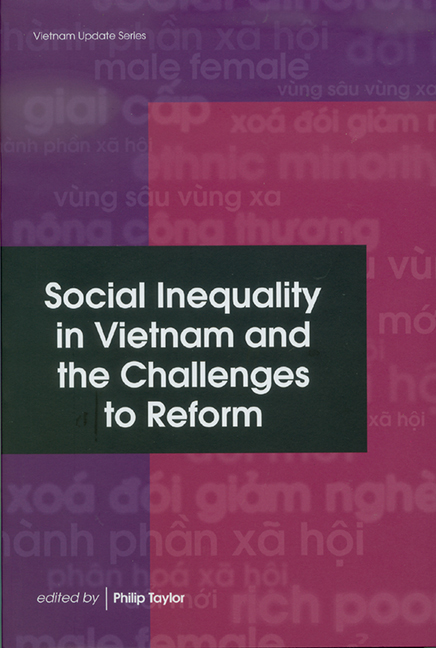Book contents
- Frontmatter
- Contents
- List of Tables
- List of Figures
- Preface
- Introduction: Social Inequality in a Socialist State
- 1 Vietnam's Recent Political Developments
- 2 Vietnam's Recent Economic Reforms and Developments: Achievements, Paradoxes, and Challenges
- 3 Behind the Numbers: Social Mobility, Regional Disparities, and New Trajectories of Development in Rural Vietnam
- 4 From Collectivization to Globalization: Social Differentiation in a Muong Ethnic Community of Vietnam
- 5 Political Capital, Human Capital, and Inter-generational Occupational Mobility in Northern Vietnam
- 6 Social Disparities in Vietnam: The Case of Poverty Reduction and Educational Attainment
- 7 Redressing Disadvantage or Re-arranging Inequality? Development Interventions and Local Responses in the Mekong Delta
- 8 The Politics of Land: Inequality in Land Access and Local Conflicts in the Red River Delta since Decollectivization
- 9 Female Garment Workers: The New Young Volunteers in Vietnam's Modernization
- 10 Class, Nation, and Text: The Representation of Peasants in Vietnamese Literature
- 11 Leisure and Social Mobility in Ho Chi Minh City
- Index
- About the Contributors
- Publications in the Vietnam Update Series
11 - Leisure and Social Mobility in Ho Chi Minh City
Published online by Cambridge University Press: 21 October 2015
- Frontmatter
- Contents
- List of Tables
- List of Figures
- Preface
- Introduction: Social Inequality in a Socialist State
- 1 Vietnam's Recent Political Developments
- 2 Vietnam's Recent Economic Reforms and Developments: Achievements, Paradoxes, and Challenges
- 3 Behind the Numbers: Social Mobility, Regional Disparities, and New Trajectories of Development in Rural Vietnam
- 4 From Collectivization to Globalization: Social Differentiation in a Muong Ethnic Community of Vietnam
- 5 Political Capital, Human Capital, and Inter-generational Occupational Mobility in Northern Vietnam
- 6 Social Disparities in Vietnam: The Case of Poverty Reduction and Educational Attainment
- 7 Redressing Disadvantage or Re-arranging Inequality? Development Interventions and Local Responses in the Mekong Delta
- 8 The Politics of Land: Inequality in Land Access and Local Conflicts in the Red River Delta since Decollectivization
- 9 Female Garment Workers: The New Young Volunteers in Vietnam's Modernization
- 10 Class, Nation, and Text: The Representation of Peasants in Vietnamese Literature
- 11 Leisure and Social Mobility in Ho Chi Minh City
- Index
- About the Contributors
- Publications in the Vietnam Update Series
Summary
This chapter describes an emerging culture of leisure among upwardly mobile migrant women in Ho Chi Minh City. The discussion focuses on the desires of and strategies used by urban migrant women, to show to others their acquired status and achievements via their recreational choices. The significance of a range of relationships between leisure and social mobility is explored through women's chosen activities in terms of their own plans for the future and those of their families. Like career options, higher income, higher levels of education, real estate and asset ownership, and use of household technologies, greater access to leisure is treated as an observable social transformation that stems from changes in economic policy and production (PuruShotam 1998). As such, leisure is both an indicator of social differentiation and distinction, but also becomes a means for demonstrating status and social mobility via markers of elite status which are recognized and responded to by others.
Even though middle classes have been present for decades in East and Southeast Asia, there is now increasing commentary on their “re-emergence” particularly as “new rich” (for example, see Chan 2000, pp. 99, 101–2; Chua and Tan 1999, p. 151; Ockey 1999, pp. 233–34). Recent media sources, including the Internet as well as glossy magazines, now provide young people with a new form of access to leisure lifestyling. Although existing in the memories of the older generation, such experiences may be “new” to younger people and can be seen reemerging and rapidly adapting to new economic conditions resulting from the doi moi economic reforms after 1986. It is the recentness of these changes coupled with the absence of previous academic scholarship on the middle classes that makes an anthropological focus attractive. The subsequent discussion thus draws heavily on my own qualitative data, in particular by highlighting examples through the retelling of ethnographic anecdotes based on fieldwork experiences.
- Type
- Chapter
- Information
- Social Inequality in Vietnam and the Challenges to Reform , pp. 351 - 379Publisher: ISEAS–Yusof Ishak InstitutePrint publication year: 2004



